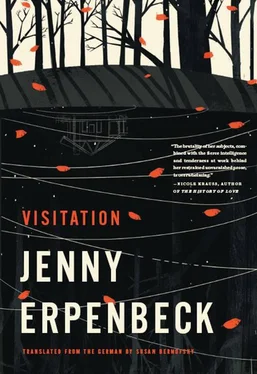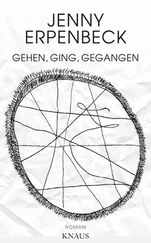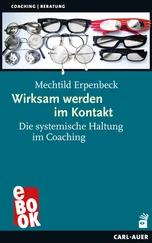My childhood was like something out of a fairytale, his wife had always said to people, smiling. She would then say something about her father, who had showed her how to catch fish, plant asparagus and handle a rake. Her father had always called her his baby girl. When she talked about her childhood, all the people listening to her always looked as if they wished they too had had childhoods like something out of a fairytale. She never spoke of her stepmother. When her father was home, her stepmother had never dared to strike her. She couldn’t remember her biological mother, and her father never talked about her. But now, a lifetime too late, she has learned on the telephone that even her father was not real and that besides her there was yet another little girl in a nearby village, her sister, whom she does not remember. Both of them, she and this other little girl, had been brought here as the small children of war refugees from the Giant Mountains on the border of Bohemia and Silesia and then had been given to different parents in different villages, her friend had said. Everyone in the village knew that. Everyone but her. Oh, I’m so sorry I, the friend says.
Should one, a lifetime too late, try to find one’s own sister, and if one actually succeeds in finding out where she is living, should one then call her, invite her for a visit or visit her oneself? Write her a letter, or else leave everything as it was before, even if from now on everything will be different? Any older woman sailing past her on a boat might be her sister. Or the madwoman who always pushes around an empty shopping cart in the nearby spa town, mumbling curses. A woman sitting in a café with a piece of cake. An energetic sixty-something seeking a non-smoking man in a classified ad, or else some scrawny old biddy in Berlin. Possibly her sister died ages ago and is already under the ground. Is everyone in the world now related to her, or is it the other way around, everyone once close to her now all at once either a stranger or dead? As a child she had always asked her father when she couldn’t make up her mind. Later, too, after her father’s death, she would imagine, whenever she wasn’t sure what to do, what he would have advised her in this or that situation. But if her father wasn’t even her father, who can give her advice? When she’d asked her husband just now whether she should call her sister, he’d just replied: You have to decide that on your own. Now, a lifetime too late, she is on her own. Where should she go if she wants to return to the place where she was actually born? The Giant Mountains?
Only a week before they climbed down into the black river from which he had emerged shortly afterward, dripping and shivering, but from which his friend had not, they had begun to give serious thought to their circumstances. In their course of study, they would soon both be facing exams that neither he nor his friend were going to pass, that much was clear. For various reasons they had used the time they should have spent studying for the exams on other things. His friend had been an organizer for the student carnival, had gone about investigating various locations and written numerous letters until finally the Museum of Natural History had agreed to open up several of its rooms to the party. Dressed as devils and swine, schoolgirls, Romans and mermaids, the students had descended upon the palatial building after closing time and had set up a cold buff et on the glass display cases, then proceeded to dance the night away between dinosaur skeletons and stuff ed gorillas, a few of them had tried to drink the alcohol from the display cases diluted with water, others had climbed into the larger dioramas, presenting tableaux vivants of love and slumber among the foxes and elks. The organization of this epic party, at which proposals of marriage were made and accepted, and children conceived, had driven every last thought of statistics and structural physics from his friend’s head. He himself, on the other hand, while out on one of his forays through the ruins of Berlin, had stumbled upon a catacomb dating from the previous century in whose vaults corpses from the Biedermeier period had been perfectly preserved along with their clothes and headwear. In their coffins they had outlasted the war and all those other, fresher deaths, and although they were shriveled up, they remained clearly recognizable down to their toenails and top hats. He had asked his now wife, who at the time was his fiancée, whether she wouldn’t like to keep one of these corpses in her hallway as a sort of valet stand. But his fiancée had thought the entire story was invented and the valet suggestion a joke, and a bad one at that, and therefore she hadn’t even laughed. He had then spent many hours down in this crypt sketching the corpses, without of course giving the least thought to the principles of physics that made it possible for a ruin, for example, to remain standing.
We have to get to the West, his friend had said then one evening when there was only a week’s time left before the exam. We’ll repeat the year there. Students from the East were held back a year when they continued their studies in the West, and that was precisely the year they had lost to their carnival and corpses. A new beginning, his friend had said. Here there was no chance: Here the files on their entire cohort — and along with them time — kept steadily advancing. Then they had thought about where their escape could be undertaken most easily. Neither he nor his friend were familiar with the terrain around the “green” unmarked border, and they didn’t have a balloon, so they decided to try the Elbe. It was still so cold, his friend had said, that the border guards wouldn’t seriously be expecting anyone to try swimming the river. We’ll get drunk first so we don’t feel the cold, and then we’ll just zip across, his friend, the Saxon, had said. Neither he nor his friend had brought up their women. Although this now appears to him beyond comprehension, he would say that at the moment he had simply forgotten all about his fiancée. One week later they packed up a pipe wrench and three bottles of wine, got on a train with their bicycles, rode the train for an hour and a half, and then from a tiny train station bicycled out to the meadows along the Elbe. There they got drunk in the dark and then, on the eve of their exams in statistics and structural physics, just as planned, they climbed down into the river to swim back a year in time.
The next time he saw his fiancée — today his wife — it was in the courtroom. She had been called as a witness and asked whether she’d known of his intention to flee the country. And she had, quite truthfully, said no. Compared with this moment, all questions regarding structural physics suddenly appeared facile, and it was clear to him that he had swum into his test rather than away from it. The swimming though is always just the same. Later he asked his fiancée to bring him a book about structural physics, he studied the book and then conducted tutorials on this subject for his fellow prisoners. The percentage of men from the construction sector that were sitting in prison just then was higher than usual: During the construction of the Berlin Wall, a number of workers had attempted to reach the other side of the very structure they were building. After serving his time in prison, he went to see his former professor and asked for permission to take the exam even though he was no longer enrolled. He passed with flying colors but never took up his studies again.
Now his wife seems to have grown calmer, he hears glasses clicking together which means she has no doubt gotten up and begun to clear the table. When he turns around he glimpses her through the curtain of willow twigs, she is just disappearing into the toolshed with a tray in her hand. His eyes come to rest on the white hanging baskets made of plastic that she has hung in the trees, these baskets are illuminated by the lantern and in their artificiality appear even further removed from the night than the light itself. The shed in which he and his wife have made themselves at home among the tools stands surrounded by darkness. Their arrangement with the mistress of the house has been only provisionally in effect ever since the heirs of the former owner of this piece of land filed for the return of their property, and so both the vacation quarters themselves and the subtenant relationship are now only makeshifts, as the mistress of the house put it. When the ownership of these heirs has been legally confirmed, they will have to leave, both he and his wife, this is what has been agreed. But when that will be is something no one knows. Subtenant sounds like a euphemism for a sort of weed, his wife had remarked after their conversation with the mistress of the house, and somehow ever since he has associated the notion weed with the happiness he experiences here when he is sailing. Happiness grows out of disorder, just as infinity grows out of the finite lake on which he is now turning his back. He and his wife spend their weekends in a toolshed, tie up their sailboat to a dock that doesn’t belong to them, and are nonetheless, he would say, utterly and completely happy on this parcel of land that they have conditionally borrowed.
Читать дальше












